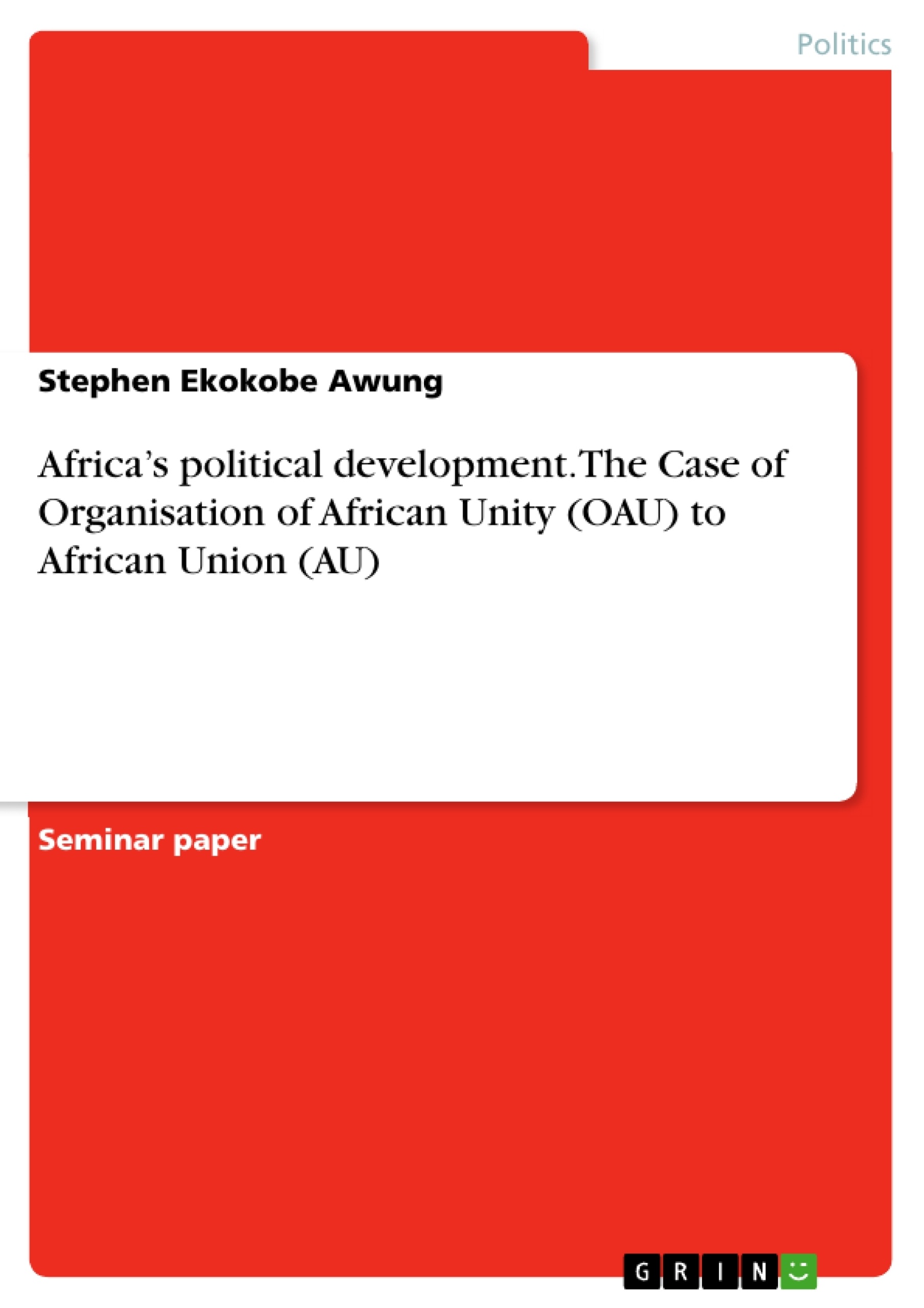This section examines the historical context of the idea of African integration, the challenges it faces and the significance in global affairs.
The majority of post independence African leaders supported the idea of African Union, some of them disagreed on the form and composition of such a union while a minority were suspicious of the idea because of greed or fear to lose their countries sovereignty. The proponents for the formation of a closer cooperation in Africa argued that Africa should not only serve as a source of cheap raw materials to western countries but a vibrant power in global affairs.
They argued that, this idea can only be achieved if all countries bring their human and material resources together to form a united front for the interest of Africans in particular and the world at large. This idea led to the formation of the Organisation of African Unity (OAU) in 1963 which was later transformed to the African Union (AU) in 2002.
Inhaltsverzeichnis (Table of Contents)
- Review
- Introduction
- Contextual meaning of the United States of Africa (USA)
- Historical context of African integration-Nkrumah's vision
- The road to African Unity-from Organisation of African Unity (OAU) to African Union (AU)
- Setbacks to the process of African Unity
Zielsetzung und Themenschwerpunkte (Objectives and Key Themes)
This work examines the historical context of African integration, its challenges, and its significance in global affairs. It traces the development of the idea of a United States of Africa, from its early origins in Pan-Africanism to the formation of the Organisation of African Unity (OAU) and its subsequent transformation into the African Union (AU).
- The concept of a United States of Africa
- Nkrumah's vision for African unity
- The role of the OAU and AU in promoting African integration
- Challenges to African integration
- The significance of African unity in global affairs
Zusammenfassung der Kapitel (Chapter Summaries)
- Review: This chapter introduces the concept of African unity and the diverse perspectives on its implementation. It highlights the arguments for a closer cooperation in Africa, aiming to shift the continent's role from a mere supplier of raw materials to a powerful force in global affairs.
- Introduction: This chapter explores the origins of the call for a United States of Africa, emphasizing the influential role of Kwame Nkrumah, who envisioned a unified Africa as a key to achieving true independence and global competitiveness.
- Contextual meaning of the United States of Africa (USA): This chapter delves into the concept of the United States of Africa, comparing it to models like the United States of America or the European Union. It traces the historical roots of the concept, highlighting the influence of figures like Marcus Garvey and W.E.B. Du Bois.
- Historical context of African integration-Nkrumah's vision: This chapter focuses on Nkrumah's role as the architect of Pan-Africanism, examining his vision for an African Union that would not only be a source of raw materials but also an economic powerhouse with its own bargaining power.
- The road to African Unity-from Organisation of African Unity (OAU) to African Union (AU): This chapter outlines the founding of the OAU, its objectives, and its eventual transformation into the African Union. It discusses the OAU's successes and failures, highlighting its role in promoting unity and its limitations in protecting the rights of Africans.
Schlüsselwörter (Keywords)
Key terms and concepts explored in this work include: African integration, United States of Africa, Pan-Africanism, Nkrumah's vision, Organisation of African Unity (OAU), African Union (AU), regional organisations, economic development, sovereignty, colonialism, global affairs, and human rights.
Frequently Asked Questions
What is the historical origin of the African Union (AU)?
The AU evolved from the Organisation of African Unity (OAU), which was founded in 1963 and later transformed into the African Union in 2002.
What was Kwame Nkrumah's vision for African unity?
Nkrumah envisioned a "United States of Africa" that would pool resources to form a vibrant power in global affairs rather than just serving as a source of raw materials for the West.
What were the main challenges to forming a united Africa?
Challenges included disagreements on the form of the union, fears of losing national sovereignty, and the diverse political interests of post-independence leaders.
How does the AU differ from the OAU?
The transformation aimed to create a more effective body for integration, though the paper notes the OAU's historical limitations in protecting human rights.
Who were the early influential figures of Pan-Africanism?
The concept of a United States of Africa was influenced by figures like Marcus Garvey and W.E.B. Du Bois before being championed by leaders like Nkrumah.
What is the significance of African integration in global affairs?
Integration is seen as a way for African countries to gain bargaining power, achieve economic independence, and protect the interests of Africans on the world stage.
- Quote paper
- Stephen Ekokobe Awung (Author), 2005, Africa’s political development. The Case of Organisation of African Unity (OAU) to African Union (AU), Munich, GRIN Verlag, https://www.grin.com/document/356329



